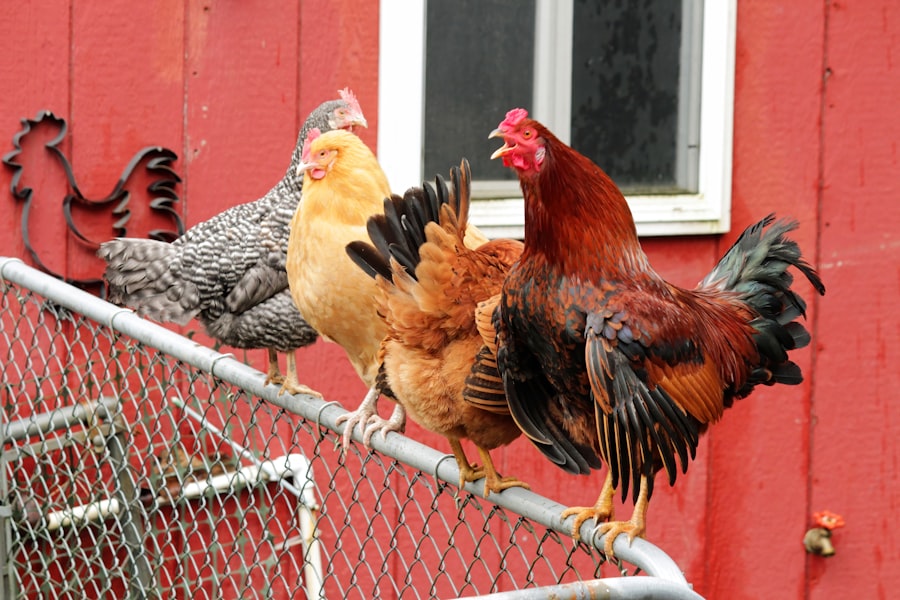The Balfour Method of keeping chickens is a holistic approach to chicken rearing that focuses on providing a natural and sustainable environment for the birds. It is named after Sir Arthur Balfour, a British statesman and chicken enthusiast who popularized this method in the early 20th century. The Balfour Method has gained popularity among chicken keepers in recent years due to its emphasis on the well-being of the chickens and the production of high-quality eggs.
Sir Arthur Balfour was known for his love of chickens and his dedication to their welfare. He believed that chickens should be given the opportunity to live in a natural environment that allows them to exhibit their natural behaviors. This philosophy has resonated with many chicken keepers who are looking for a more ethical and sustainable way to raise their birds.
The Balfour Method is gaining popularity among chicken keepers because it offers numerous benefits over traditional methods of chicken rearing. By providing a natural and stress-free environment, chickens raised using the Balfour Method are healthier and happier. This leads to higher quality eggs and meat, as well as a more sustainable and eco-friendly approach to chicken keeping.
Key Takeaways
- The Balfour Method is a holistic approach to chicken rearing that emphasizes natural living conditions and minimal intervention.
- Benefits of the Balfour Method include healthier chickens, better egg production, and reduced costs for feed and medication.
- Key elements of the Balfour Method include providing ample space, fresh air, and natural light, as well as allowing chickens to forage and dust bathe.
- Some chicken breeds are better suited to the Balfour Method than others, with considerations including temperament, hardiness, and egg-laying ability.
- Preparing a chicken coop for the Balfour Method involves ensuring proper ventilation, insulation, and predator protection, as well as providing appropriate nesting boxes and roosts.
The Benefits of the Balfour Method for Chicken Rearing
One of the main benefits of the Balfour Method is that it promotes the health and happiness of the chickens. By allowing them to live in a natural environment with access to fresh air, sunlight, and plenty of space to roam, chickens raised using this method are less prone to stress and disease. They also have the opportunity to engage in natural behaviors such as scratching, pecking, and dust bathing, which helps to keep them mentally and physically stimulated.
In addition to promoting the well-being of the chickens, the Balfour Method is also more sustainable and eco-friendly than traditional methods of chicken rearing. By allowing the chickens to free-range and forage for their own food, the reliance on commercial feed is reduced. This not only saves money but also reduces the environmental impact of chicken keeping. Furthermore, the Balfour Method encourages the use of natural and organic methods for pest control and fertilization, minimizing the use of harmful chemicals.
Another benefit of the Balfour Method is the production of higher quality eggs. Chickens raised using this method have access to a varied diet that includes insects, worms, and grass, which results in eggs that are richer in nutrients and have a deeper color. The eggs also have a thicker shell and a more flavorful yolk. This is because the chickens are able to engage in natural behaviors that contribute to the development of these qualities, such as scratching for minerals and eating a diverse range of foods.
Understanding the Basics of the Balfour Method
The Balfour Method is based on the principles of free-range chicken keeping and minimal intervention. Free-range chickens have access to a large outdoor area where they can roam and forage for food. This allows them to engage in natural behaviors and leads to healthier and happier chickens. Confined chickens, on the other hand, are kept in small enclosures with limited access to fresh air and sunlight. This can lead to stress and disease.
Natural light and fresh air are essential for the health and well-being of chickens. Natural light provides important vitamins and helps regulate their internal clocks. Fresh air helps to prevent respiratory problems and keeps the coop smelling fresh. It is important to provide adequate ventilation in the chicken coop to ensure good air circulation.
The Balfour Method also emphasizes a minimal intervention approach to chicken keeping. This means allowing the chickens to live as naturally as possible without unnecessary interference from humans. While it is important to provide care and attention to the chickens, it is also important to allow them to develop their own social hierarchy and solve problems on their own. This helps to promote their natural instincts and behaviors.
Choosing the Right Chicken Breeds for the Balfour Method
When adopting the Balfour Method, it is important to choose chicken breeds that are well-suited to a free-range environment. Some breeds are better at foraging and adapting to outdoor living than others. Breeds such as Rhode Island Reds, Sussex, and Australorps are known for their ability to thrive in free-range environments.
Dual-purpose breeds are also a good choice for the Balfour Method as they are suitable for both meat and egg production. Breeds such as Plymouth Rocks and Orpingtons are known for their ability to lay a good number of eggs while also producing quality meat.
Heritage breeds are another option to consider when adopting the Balfour Method. These breeds have been around for many years and have a diverse genetic background. By raising heritage breeds, you can help preserve genetic diversity in the chicken population.
Preparing the Chicken Coop for the Balfour Method
The size and layout of the chicken coop are important considerations when adopting the Balfour Method. The coop should be spacious enough to allow the chickens to move around freely and engage in natural behaviors such as scratching and dust bathing. It should also provide protection from predators and the elements.
Nesting boxes and roosting poles are essential features of a chicken coop. Nesting boxes provide a safe and comfortable place for the hens to lay their eggs, while roosting poles allow them to perch at night. It is important to provide enough nesting boxes and roosting poles to accommodate all of the chickens.
Ventilation is another important aspect of the chicken coop. Good air circulation helps prevent respiratory problems and keeps the coop smelling fresh. It is important to provide windows or vents that can be opened or closed depending on the weather conditions.
Predator-proofing is also essential when adopting the Balfour Method. Chickens are vulnerable to predators such as foxes, raccoons, and hawks. It is important to secure the coop with sturdy fencing and wire mesh to keep predators out. It is also a good idea to provide a secure enclosure for the chickens to roam in during the day.
Feeding and Watering Chickens in the Balfour Method

Feeding chickens a balanced diet is important for their health and well-being. Commercial chicken feed should form the basis of their diet, as it provides essential nutrients that may not be available through foraging alone. It is important to choose a high-quality feed that is appropriate for the age and breed of the chickens.
Supplementing the diet with kitchen scraps and foraging is another important aspect of the Balfour Method. Chickens are natural foragers and enjoy scratching for insects, worms, and grass. Providing them with access to a varied diet helps to keep them mentally and physically stimulated.
Clean water is essential for the health of chickens. It is important to provide fresh water daily and ensure that it is easily accessible to the chickens. Waterers should be cleaned regularly to prevent the growth of bacteria.
Managing Chicken Health in the Balfour Method
Preventative measures are important for maintaining the health of chickens raised using the Balfour Method. This includes regular cleaning of the coop, providing a clean and dry environment, and practicing good biosecurity measures. It is also important to monitor the chickens for signs of illness or injury and seek veterinary care when necessary.
Natural remedies can be used to treat minor ailments in chickens. For example, apple cider vinegar can be added to their water to help prevent internal parasites, while garlic can be added to their feed to boost their immune system. It is important to research natural remedies and consult with a veterinarian before using them.
There are times when veterinary care is necessary for the health of the chickens. It is important to have a good relationship with a veterinarian who is knowledgeable about poultry health and can provide guidance and treatment when needed.
Egg Production and Collection in the Balfour Method
Egg production can be influenced by a variety of factors, including breed, age, diet, and environmental conditions. Chickens raised using the Balfour Method are more likely to lay eggs consistently and produce higher quality eggs due to the natural and stress-free environment they are provided.
Collecting and storing eggs properly is important for maintaining their freshness and quality. Eggs should be collected daily and stored in a cool and dry place. It is important to clean dirty eggs before storing them, but it is not necessary to wash clean eggs as this can remove the protective bloom.
Using eggs for cooking and baking is one of the joys of chicken keeping. The high-quality eggs produced by chickens raised using the Balfour Method have a richer flavor and a deeper color, which can enhance the taste of your favorite recipes.
Common Challenges and Solutions in the Balfour Method
Dealing with predators is one of the common challenges faced by chicken keepers using the Balfour Method. It is important to secure the coop with sturdy fencing and wire mesh to keep predators out. Providing a secure enclosure for the chickens to roam in during the day can also help protect them from predators.
Managing flock dynamics can also be a challenge when adopting the Balfour Method. Chickens have a social hierarchy and establishing pecking order is a natural behavior. However, it is important to monitor the flock for signs of aggression or bullying and intervene if necessary.
Addressing egg-eating and other bad habits is another challenge that chicken keepers may face. Egg-eating can be caused by boredom or nutritional deficiencies. Providing plenty of enrichment activities and a balanced diet can help prevent this behavior. It is also important to collect eggs regularly to prevent them from becoming a target for pecking.
Is the Balfour Method Right for You and Your Chickens?
The Balfour Method of keeping chickens offers numerous benefits for both the chickens and the chicken keeper. By providing a natural and sustainable environment, chickens raised using this method are healthier and happier. They also produce higher quality eggs and meat. The Balfour Method is gaining popularity among chicken keepers due to its ethical and sustainable approach to chicken rearing.
Before adopting the Balfour Method, it is important to consider factors such as space, time commitment, and local regulations. It is also important to educate yourself about chicken keeping and the specific needs of the breeds you choose to raise. There are many resources available, including books, websites, and local chicken keeping groups, that can provide guidance and support.
In conclusion, the Balfour Method offers a holistic approach to chicken rearing that promotes the health and well-being of the chickens while also producing high-quality eggs and meat. By providing a natural and stress-free environment, chickens raised using this method are happier and healthier. If you are looking for a more ethical and sustainable way to raise your chickens, the Balfour Method may be right for you.
If you’re interested in the Balfour method of keeping chickens, you might also find this article on chicken coop door size from Poultry Wizard helpful. It provides valuable insights on the ideal dimensions for your chicken coop door to ensure easy access for your feathered friends. Additionally, Poultry Wizard offers a comprehensive guide on chicken coop nest boxes, which can be a great addition to your Balfour-inspired setup. Lastly, if you’re concerned about keeping your chickens warm during colder months, Poultry Wizard has an informative article on choosing the right heater for your chicken coop. Check out these resources to enhance your knowledge and create a comfortable environment for your flock.
FAQs
What is the Balfour method of keeping chickens?
The Balfour method of keeping chickens is a system of poultry keeping that was developed by Sir Arthur Balfour in the early 20th century. It involves keeping chickens in small, movable coops that are rotated around a pasture or garden area.
What are the benefits of using the Balfour method?
The Balfour method has several benefits, including improved soil fertility, reduced pest problems, and healthier chickens. The method also allows for more efficient use of space and resources, as the chickens are able to forage for much of their food.
How does the Balfour method work?
The Balfour method involves keeping chickens in small, movable coops that are rotated around a pasture or garden area. The chickens are allowed to forage for much of their food, which helps to improve soil fertility and reduce pest problems. The coops are moved every few days to a new area, which allows the chickens to have access to fresh grass and insects.
What kind of chickens are best suited for the Balfour method?
Any breed of chicken can be used with the Balfour method, but some breeds may be better suited than others. Breeds that are good foragers and are able to thrive on a varied diet are generally the best choice.
What kind of coop is needed for the Balfour method?
The coops used for the Balfour method are typically small and lightweight, and are designed to be easily moved around the pasture or garden area. They should be large enough to comfortably house the chickens, but not so large that they are difficult to move.
Is the Balfour method suitable for large-scale chicken farming?
The Balfour method is generally not suitable for large-scale chicken farming, as it is a labor-intensive system that requires a lot of manual labor. However, it can be a good option for small-scale or backyard chicken farming.
Meet Walter, the feathered-friend fanatic of Florida! Nestled in the sunshine state, Walter struts through life with his feathered companions, clucking his way to happiness. With a coop that’s fancier than a five-star hotel, he’s the Don Juan of the chicken world. When he’s not teaching his hens to do the cha-cha, you’ll find him in a heated debate with his prized rooster, Sir Clucks-a-Lot. Walter’s poultry passion is no yolk; he’s the sunny-side-up guy you never knew you needed in your flock of friends!







